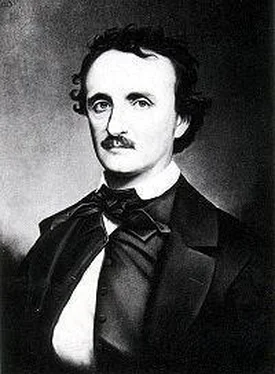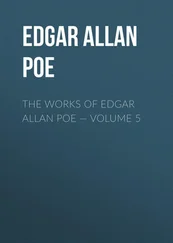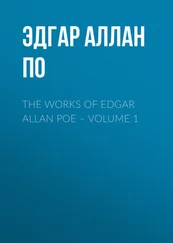Эдгар По - Works of Edgar Allan Poe
Здесь есть возможность читать онлайн «Эдгар По - Works of Edgar Allan Poe» весь текст электронной книги совершенно бесплатно (целиком полную версию без сокращений). В некоторых случаях можно слушать аудио, скачать через торрент в формате fb2 и присутствует краткое содержание. Жанр: Старинная литература, на английском языке. Описание произведения, (предисловие) а так же отзывы посетителей доступны на портале библиотеки ЛибКат.
- Название:Works of Edgar Allan Poe
- Автор:
- Жанр:
- Год:неизвестен
- ISBN:нет данных
- Рейтинг книги:4 / 5. Голосов: 1
-
Избранное:Добавить в избранное
- Отзывы:
-
Ваша оценка:
- 80
- 1
- 2
- 3
- 4
- 5
Works of Edgar Allan Poe: краткое содержание, описание и аннотация
Предлагаем к чтению аннотацию, описание, краткое содержание или предисловие (зависит от того, что написал сам автор книги «Works of Edgar Allan Poe»). Если вы не нашли необходимую информацию о книге — напишите в комментариях, мы постараемся отыскать её.
Works of Edgar Allan Poe — читать онлайн бесплатно полную книгу (весь текст) целиком
Ниже представлен текст книги, разбитый по страницам. Система сохранения места последней прочитанной страницы, позволяет с удобством читать онлайн бесплатно книгу «Works of Edgar Allan Poe», без необходимости каждый раз заново искать на чём Вы остановились. Поставьте закладку, и сможете в любой момент перейти на страницу, на которой закончили чтение.
Интервал:
Закладка:
"O happy living things! no tongue Their beauty might declare: A spring of love gushed from my heart, And I blessed them unaware: Sure my kind saint took pity on me, And I blessed them unaware."
Poe created the fifth line of his stanza for the magic of the repetend. He relied upon it to the uttermost in a few later poems,--"Lenore," "Annabel Lee," "Ulalume," and "For Annie." It gained a wild and melancholy music, I have thought, from the "sweet influences," of the Afric burdens and repetends that were sung to him in childhood, attuning with their native melody the voice of our Southern poet.
"The Philosophy of Composition," his analysis of The Raven , is a technical dissection of its method and structure. Neither his avowal of cold-blooded artifice, nor his subsequent avowal to friends that an exposure of this artifice was only another of his intellectual hoaxes, need be wholly credited. If he had designed the complete work in advance, he scarcely would have made so harsh a prelude of rattle-pan rhymes to the delicious melody of the second stanza,--not even upon his theory of the fantastic. Of course an artist, having perfected a work, sees, like the first Artist, that it is good, and sees why it is good. A subsequent analysis, coupled with a disavowal of any sacred fire, readily enough may be made. My belief is that the first conception and rough draft of this poem came as inspiration always comes; that its author then saw how it might be perfected, giving it the final touches described in his chapter on Composition, and that the latter, therefore, is neither wholly false nor wholly true. The harm of such analysis is that it tempts a novice to fancy that artificial processes can supersede imagination. The impulse of genius is to guard the secrets of its creative hour. Glimpses obtained of the toil, the baffled experiments, which precede a triumph, as in the sketch-work of Hawthorne recently brought to light, afford priceless instruction and encouragement to the sincere artist. But one who voluntarily exposes his Muse to the gaze of all comers should recall the fate of King Candaules.
The world still thinks of Poe as a "luckless man of genius." I recently heard him mentioned as "one whom everybody seems chartered to misrepresent, decry or slander." But it seems to me that his ill-luck ended with his pitiable death, and that since then his defence has been persistent, and his fame of as steadfast growth as a suffering and gifted author could pray for in his hopeful hour. Griswold's decrial and slander turned the current in his favor. Critics and biographers have come forward with successive refutations, with tributes to his character, with new editions of his works. His own letters and the minute incidents of his career are before us; the record, good and bad, is widely known. No appellor has received more tender and forgiving judgement. His mishaps in life belonged to his region and period, perchance still more to his own infirmity of will. Doubtless his environment was not one to guard a fine-grained, ill-balanced nature from perils without and within. His strongest will, to be lord of himself, gained for him "that heritage of woe." He confessed himself the bird's unhappy master, the stricken sufferer of this poem. But his was a full share of that dramatic temper which exults in the presage of its own doom. There is a delight in playing one's high part: we are all gladiators, crying Ave Imperator! To quote Burke's matter of fact: "In grief the pleasure is still uppermost, and the affliction we suffer has no resemblance to absolute pain, which is always odious, and which we endeavor to shake off as soon as possible." Poe went farther, and was an artist even in the tragedy of his career. If, according to his own belief, sadness and the vanishing of beauty are the highest poetic themes, and poetic feeling the keenest earthly pleasure, then the sorrow and darkness of his broken life were not without their frequent compensation.
In the following pages, we have a fresh example of an artist's genius characterizing his interpretation of a famous poem. Gustave Dore, the last work of whose pencil is before us, was not the painter, or even the draughtsman, for realists demanding truth of tone, figure, and perfection. Such matters concerned him less than to make shape and distance, light and shade, assist his purpose,--which was to excite the soul, the imagination, of the looker on. This he did by arousing our sense of awe, through marvellous and often sublime conceptions of things unutterable and full of gloom or glory. It is well said that if his works were not great paintings, as pictures they are great indeed. As a "literary artist," and such he was, his force was in direct ratio with the dramatic invention of his author, with the brave audacities of the spirit that kindled his own. Hence his success with Rabelais, with "Le Juif-Errant," "Les Contes Drolatiques," and "Don Quixote," and hence, conversely, his failure to express the beauty of Tennyson's Idyls, of "Il Paradiso," of the Hebrew pastorals, and other texts requiring exaltation, or sweetness and repose. He was a born master of the grotesque, and by a special insight could portray the spectres of a haunted brain. We see objects as his personages saw them, and with the very eyes of the Wandering Jew, the bewildered Don, or the goldsmith's daughter whose fancy so magnifies the King in the shop on the Pont-au-Change. It was in the nature of things that he should be attracted to each masterpiece of verse or prose that I have termed unique. The lower kingdoms were called into his service; his rocks, trees and mountains, the sky itself, are animate with motive and diablerie. Had he lived to illustrate Shakespeare, we should have seen a remarkable treatment of Caliban, the Witches, the storm in "Lear"; but doubtless should have questioned his ideals of Imogen or Miranda. Beauty pure and simple, and the perfect excellence thereof, he rarely seemed to comprehend.
Yet there is beauty in his designs for the "Ancient Mariner," unreal as they are, and a consecutiveness rare in a series by Dore. The Rime afforded him a prolonged story, with many shiftings of the scene. In The Raven sound and color preserve their monotone and we have no change of place or occasion. What is the result? Dore proffers a series of variations upon the theme as he conceived it, "the enigma of death and the hallucination of an inconsolable soul." In some of these drawings his faults are evident; others reveal his powerful originality, and the best qualities in which, as a draughtsman, he stood alone. Plainly there was something in common between the working moods of Poe and Dore. This would appear more clearly had the latter tried his hand upon the "Tales of the Grotesque and Arabesque." Both resorted often to the elf-land of fantasy and romance. In melodramatic feats they both, through their command of the supernatural, avoided the danger-line between the ideal and the absurd. Poe was the truer worshipper of the Beautiful; his love for it was a consecrating passion, and herein he parts company with his illustrator. Poet or artist, Death at last transfigures all: within the shadow of his sable harbinger, Vedder's symbolic crayon aptly sets them face to face, but enfolds them with the mantle of immortal wisdom and power. An American woman has wrought the image of a star-eyed Genius with the final torch, the exquisite semblance of one whose vision beholds, but whose lips may not utter, the mysteries of a land beyond "the door of a legended tomb."
EDMUND C. STEDMAN.
THE POEM.
THE RAVEN.
Once upon a midnight dreary, while I pondered, weak and weary,
Over many a quaint and curious volume of forgotten lore,
While I nodded, nearly napping, suddenly there came a tapping,
As of some one gently rapping, rapping at my chamber door.
"'Tis some visitor," I muttered, "tapping at my chamber door —
Читать дальшеИнтервал:
Закладка:
Похожие книги на «Works of Edgar Allan Poe»
Представляем Вашему вниманию похожие книги на «Works of Edgar Allan Poe» списком для выбора. Мы отобрали схожую по названию и смыслу литературу в надежде предоставить читателям больше вариантов отыскать новые, интересные, ещё непрочитанные произведения.
Обсуждение, отзывы о книге «Works of Edgar Allan Poe» и просто собственные мнения читателей. Оставьте ваши комментарии, напишите, что Вы думаете о произведении, его смысле или главных героях. Укажите что конкретно понравилось, а что нет, и почему Вы так считаете.












